When it comes to motherhood, Dolly Parton may not have taken the traditional path. Known as a motherly figure to many, the iconic singer has recently opened up about her personal decision to not have children. In a candid interview with Saga magazine, Dolly revealed her thoughts and reflections on this often misunderstood aspect of her life.
Inquisitive minds questioned whether Dolly Parton had any regrets about not becoming a mother. Her response was unequivocal: “I haven’t missed it like I thought I might.” Contrary to societal expectations, Dolly was content with her chosen path. As a young couple, she and her husband assumed they would have children, but the burning desire to become a mother did not consume her. Instead, Dolly prioritized her career, passion for music, and the freedom of traveling. She acknowledged that having children would have required her to dedicate her life to them wholeheartedly, and she was not prepared to make that sacrifice. Dolly confidently stated, “God didn’t let me have children so that all kids could be mine.” Her perspective on childlessness is a remarkable testament to her selflessness and the love she has for all children.
A Change of Heart
Dolly Parton’s journey towards accepting her childfree life has been a gradual process. In a 2014 interview with Billboard, she revealed that early on in her relationship with her husband, they assumed they would eventually have children. They even went as far as choosing names for their future offspring. However, fate had other plans. As Dolly and her husband grew older, they began to appreciate the freedom and lack of worry that came with not having children. Looking back, they often laugh, saying, “Aren’t you glad we didn’t have kids? Now we don’t have kids to worry about.” This change of heart is a testament to their unwavering love and happiness in their decision.
Apart from personal choices, health issues played a significant role in Dolly Parton’s decision not to have children. At the age of 35, she was diagnosed with endometriosis, a condition that causes extreme pain as tissue similar to the lining of the womb grows outside the uterus. This condition can severely impact fertility. Statistics reveal that 30-50% of individuals with endometriosis face difficulties in conceiving. To alleviate her pain, Dolly underwent a partial hysterectomy at the age of 36. As a result, she was unable to conceive naturally. The aftermath of the operation left her feeling desolate and marked the beginning of a dark period in her life. Despite the physical and emotional challenges she faced, Dolly persevered and found solace in her music and the support of her loving husband.
A Lasting Love
Although Dolly and her husband, Carl, did not have children, their marriage has stood the test of time. Celebrating over 50 years together, their relationship serves as a shining example of love, companionship, and understanding. In an interview on the Zoe Ball Breakfast Show, Dolly described their mutual honesty as the secret to their enduring happiness. Carl may not volunteer his thoughts initially, but when Dolly seeks his opinion, he provides genuine and sincere answers. Their shared sense of humor, respect, and love have solidified their bond throughout the years. Dolly admiringly described her husband as crazy, funny, and clever, emphasizing how much she simply likes spending time with him. Their unconventional love story, devoid of children, proves that there are many different paths to a fulfilling and joyful life.
In a world that often places great emphasis on traditional family structures, it is important to recognize and respect individual choices. Dolly Parton’s decision not to have children exemplifies the power of self-awareness, personal priorities, and the ability to find contentment outside societal expectations. Her story serves as a reminder that fulfillment comes in many forms and that each person’s journey is unique. Society should embrace and celebrate the choices of individuals like Dolly, who forge their paths based on their own needs and aspirations.

